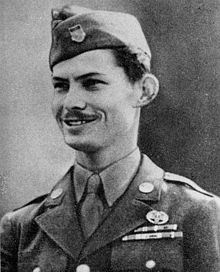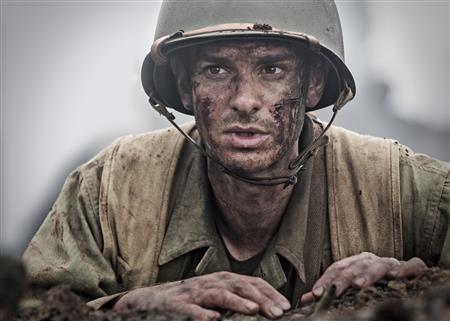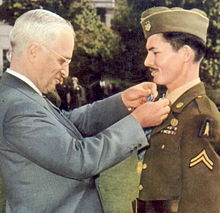 |
| (https://en.wikipedia.org/wiki/Desmond_Doss ()) |
Through Pain and Gain "Non-violence is not a garment to be put on and off at will. Its seat is in the heart, and it must be an inseparable part of our being," (Mahatma Gandhi). Desmond T. Doss was a person highly committed to his belief in nonviolence. Joining the U.S. Army voluntarily, Doss was determined to fight for what he believed in, as an Army medic in World War II, but at the same time staying committed to his belief of non-violence. "Desmond Doss was born on February 7, 1919, in Lynchburg, Virginia. The son of William Thomas Doss, a carpenter, and Bertha Edward Oliver Doss, a shoemaker, he was raised in a devout Seventh Day Adventist family." (Telzrow) Being raised as a Seventh Day Adventist, Desmond Doss was taught to believe in nonviolence. He had sworn to himself that he would never possess a firearm, even at war, and became known as the man who never carried a gun. Desmond T. Doss was a hero and inspiration to the world because of his resilience through pain and hardship, his belief in nonviolence, and his determination to save lives.
 |
| (https://www.armytimes.com/story/entertainment/2016 ()) |
Desmond Doss was a hero because of his resilience through pain and hardship, whether it was emotional or physical pain. During boot camp training, Doss was constantly mocked and teased for refusing to carry a firearm. His comrades saw him as a slacker and a coward. Whenever Desmond would kneel down to pray, other soldiers threw shoes at him to try and make him feel unwelcome, and questioned him why he had even decided to join the military. Despite this, Desmond was resilient, stayed true to his beliefs, and kept working toward his goal of being an Army medic. Doss faced physical pain as well. During a firefight, a hand grenade was thrown into Desmond's cover. He thought on his feet and attempted to kick the grenade away. "He had only one thought in his mind, and that was to protect his beloved men. Unable to kick the grenade clear, Doss was rocked by an earsplitting explosion that sent 17 pieces of white-hot shrapnel into his body. Treating himself for shock, he took refuge in the foxhole with his platoon mates and spent a terrifying five hours within yards of the enemy on Okinawa," (Telzrow). Throughout his time serving in the Army, Doss remained resilient to all types of pain, and refused to put other's lives in danger so even if he needed assistance, making him all the more deserving to have the title of a hero.
Another reason Desmond Doss was a hero and inspired the world was his belief in nonviolence. Even as a young boy, Doss had a particular interest in the ten commandments, having a painting depicting them in his household. He gave great thought about one image in particular, in which Cain is killing his brother Abel, and came to the conclusion that he would never kill. "He refused to touch a gun, yet wanted to serve his country during WWII. After being mocked and badgered for his pacifism, he became a hero," (Telzrow). Doss was looked at as a coward and a disgrace of a man fighting for his country because of his refusal to pick up a weapon. Only during his actions on Hacksaw Ridge could his comrades see how much he could achieve by sticking to his belief of not carrying a weapon.
Desmond's determination to save lives ultimately led to his heroic actions on Hacksaw Ridge, a four hundred foot cliff near Urasoe Mura, Okinawa. While in the middle of a firefight, Doss went from soldier to soldier, treating their wounds and then moving on to the next wounded soldier. After treating each soldier, he tied them to a rope and lowered them down the cliff where they were be met by other fellow soldiers. Doss refused to leave the wounded behind and saw the only way to save his comrades was to treat as many soldiers as he could and then lower them down Hacksaw Ridge to safety. His determination to save others' lives placed his own life at risk. "One soldier was severely wounded by fire from a cave. Under enemy fire, Pfc. Doss crawled to where the soldier lay near the enemy position, rendered aid, and carried him 100 yards to safety," (VandeVere). While in the middle of a firefight, Doss spotted a soldier lying on the ground, severely wounded. Doss, praying that God was on his side, was determined to save another life even while under fire by enemy lines. "Doss turned to help another wounded soldier and prayed, 'Lord, help me to get one more, just ONE more.' The 'one more' became 75 men Doss lowered to safety," (VandeVere). Committed to not leaving the wounded behind, Doss' determination kept him going, treating one soldier after another and then lowering them down the cliff to safety. "'He was one of the bravest persons alive, and then to have him end up saving my life was the irony of the whole thing,' said Capt. Jack Glover in a documentary about Doss' life. Glover had wanted Doss out of the unit when he first joined up," (Lange). Capt. Jack Glover explains the irony as the situation as he was one who saw Desmond as a slacker, compared to the other soldiers.
 |
| (https://en.wikipedia.org/wiki/Desmond_Doss ()) |
Desmond T. Doss is remembered as a hero and is an inspiration to the world because of his resilience to pain, his belief in nonviolence, and his determination to put others' lives ahead of his own. After the events on Hacksaw Ridge, Doss was considered a hero by his comrades in the military, as well as others of higher authority. "President Harry Truman awarded Desmond Doss the Congressional Medal of Honor on October 12, 1945. He told Doss, 'I'm proud of you; you really deserve this. I consider this a greater honor than being President,'" (VandeVere). Desmond Doss inspires me to have the mindset of finding another way before resorting to violence in any situation. He has inspired me to take into consideration that someone else has just as much the right to live as I do. Whether it's as simple as a "hello" or risking my own life to help them, I promise myself to help others in any way I can. Everyone should know Desmond T. Doss' story. With Doss' story more widely known, people will know what one can achieve without resorting to violence and what defines a true hero. Works Cited: "In His Own Words: Watch Hacksaw Ridge Hero and Medal of Honor Recipient Desmond Doss Tell His Story." PR Newswire, 7 Nov. 2016. Biography in Context, link.galegroup.com/apps/doc/A469246507/BIC1?u=powa9245&xid=eb9e8a08. Accessed 1 May 2017. "PFC. DESMOND DOSS: THE UNLIKELY HERO BEHIND 'HACKSAW RIDGE'." States News Service, 28 Feb. 2017. Biography in Context, link.galegroup.com/apps/doc/A484395112/BIC1?u=powa9245&xid=b4488ee1. Accessed 4 May 2017. Telzrow, Michael E. "Desmond Doss: his only weapon was his conscience." The New American, 7 Nov. 2016, p. 34+. Biography in Context, link.galegroup.com/apps/doc/A472002704/BIC1?u=powa9245&xid=7dff52ca. Accessed 1 May 2017. "THE REAL 'HACKSAW RIDGE' SOLDIER SAVED 75 SOULS WITHOUT EVER CARRYING A GUN." States News Service, 4 Nov. 2016. Biography in Context, link.galegroup.com/apps/doc/A469844324/BIC1?u=powa9245&xid=517bd90b. Accessed 5 May 2017. VandeVere, Evie. "Desmond T. Doss." Boy's Quest, Oct.-Nov. 2010, p. 46+. Research in Context, go.galegroup.com/ps/i.do?p=MSIC&sw=w&u=powa9245&v=2.1&id=GALE%7CA239117360&it=r&asid=3bc5cbc601b212d262e4ad6949ca7e5. Accessed 4 May 2017.
Page created on 5/20/2017 12:00:00 AM
Last edited 5/20/2017 12:00:00 AM
